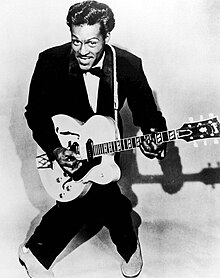
"I'll Be Doggone" is a 1965 song recorded by American soul singer Marvin Gaye and released on the Tamla label. The song talks about how a man tells his woman that he'll be "doggone" about simple things but if she did him wrong that he'd be "long gone". The song was written by Smokey Robinson, Warren Moore and Marv Tarplin, initially for The Temptations, who rejected the song.

Tages were a Swedish rock band formed in Gothenburg in 1963. The group, whose original line-up consisted of Tommy Blom, Göran Lagerberg, Danne Larsson, Anders Töpel and Freddie Skantze, were one of the most successful Swedish bands of the 1960s. They achieved thirteen top-20 singles on Kvällstoppen, such as "Sleep Little Girl", "I Should Be Glad", "In My Dreams", and "Miss Mac Baren", as well as having two albums certified gold, Tages (1965) and Tages 2 (1966).

"Miss Mac Baren" is a song by the Swedish rock band Tages, released as a single in November 1966. It was written by all five members of the group and was recorded during the sessions for their third studio album, Extra Extra, but was ultimately excluded from it. The B-side, "Get Up An' Get Goin'", was however included as the fourth track on the album. "Miss Mac Baren" got its first album release on Tages Hits Vol. 3, a compilation album released in August 1967.
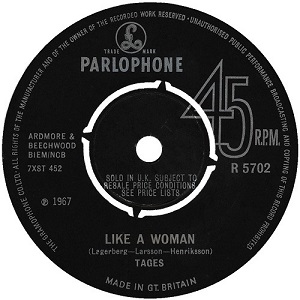
"Like a Woman" is a song written by Swedish producer Anders Henriksson, bassist Göran Lagerberg and guitarist Danne Larsson, originally recorded by Lagerberg and Larsson's band Tages in 1967. Tages recorded the track at EMI Studios in London. It was initially released on the band's fifth album Studio (1967), before being used as the B-side of their 1968 single "There's a Blind Man Playin' Fiddle in the Street". The title references a girl that Lagerberg knew and musically bases on characteristics of psychedelic pop, including guitars run through leslie speakers
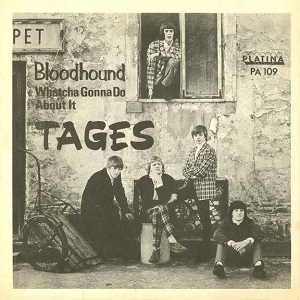
"Bloodhound" is a song, initially written and performed by soul singer Larry Bright in 1961. Initially performed as a rhythm and blues song, it quickly garnered a reputation as a garage rock song following a cover by British rock band Downliners Sect. The most well-known and commercially successful rendition of the song was recorded by Swedish rock band Tages in 1965, who charted on both Tio i Topp and Kvällstoppen with their garage rock version of it.
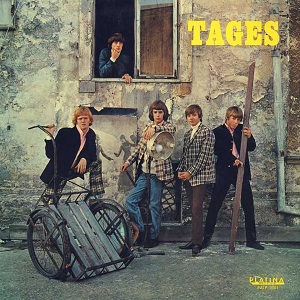
Tages is the debut studio album by the Swedish rock band Tages, released on 3 November 1965 on Platina Records. Released during a period in which the band had accumulated four top ten singles in Tio i Topp and as many on Kvällstoppen. This led the band to become one of Sweden's first and foremost pop groups, along with Hep Stars.
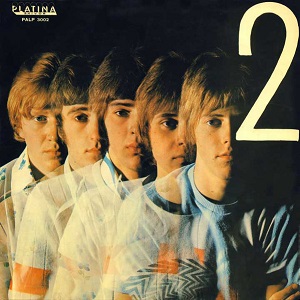
Tages 2 is the second studio album by the Swedish rock band Tages, released on 4 August 1966 by Platina Records. Often considered their artistic breakthrough, six out of twelve tracks are original compositions.

"Sleep Little Girl" is the debut single by the Swedish rock band Tages. It was written by Tommy Blom and released on 16 October 1964. The initial recording was made at a Youth center at Nylöse, a neighborhood of Gothenburg, Sweden's second biggest city, and the song has professionally been re-recorded in a studio twice.
"Crazy 'Bout My Baby" is a song first written and recorded by musician Robert Mosley in 1963. His third solo single, it failed to chart, leading to it becoming his final single released. Initially an obscure single, it was brought to light by mainstream acts such as The Swinging Blue Jeans and Tages, the latter of which charted in Sweden with it.

Tages formed in May 1963 as a duo and quickly expanded into quintet, though no music by them would be released until more than a year later, when their debut single "Sleep Little Girl" was released in October 1964. Up until October 1968, 23 singles by the group were released, though six of those were unauthorized. Out of these singles, 13 managed to reach both Kvällstoppen and Tio i Topp while two further singles only reached Tio I Topp. In 1969, the band changed their name to Blond and three further singles were released between July 1969 and July 1970, out of which one reached Tio i Topp. Combined under both names, the band released in total 27 singles between October 1964 and July 1970.
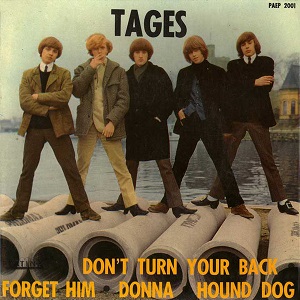
Tages is the first seven-inch extended play by Swedish rock group Tages, a release which features four songs, two of which showcase the early songwriting talent of the band. It was initially released on 4 June 1965 in 1000 copies on Platina Records.

"Don't Turn Your Back" is a song written by bass guitarist Göran Lagerberg and guitarist Anders Töpel, first recorded by their band Tages in 1965. Produced by the Violents Rune Wallebom, the song would be featured as the lead track from their debut EP Tages released three weeks later

"I Should Be Glad" is a song by the Swedish rock band Tages, written by bassist Göran Lagerberg and rhythm guitarist Danne Larsson in 1964. Following bad press for their debut single "Sleep Little Girl", the group quickly recorded a follow-up which critics would consider good.

Göran Bertil Lagerberg is a Swedish musician and singer-songwriter, best known as the bass guitarist and co-lead vocalist in Swedish rock band Tages and later progressive rock act Kebnekajse. In the 1990s, he was a member of supergroup Grymlings together with Magnus Lindberg, Pugh Rogefeldt and Mikael Rickfors.
Platina Records was a Swedish independent record label founded in 1964 by businessman and songwriter Evert Jakobsson. The label saw great success throughout the mid-1960s with rock acts such as Tages, before turning to dansband music in the 1970s, gaining success with Flamingokvintetten and Thorleifs. After turning to pay to play in 1984, the label shut down in 1989.
"Someone's Taken Maria Away" is a song written by Chris Andrews, initially recorded by British singer Adam Faith and his backing group the Roulettes. It was Faith's final top-40 hit in the United Kingdom, reaching number 34 on the UK Singles Chart in June 1965. However, today it is most commonly known for the version recorded by Swedish band Tom & Mick & Maniacs under the title "Somebody's Taken Maria Away" in 1967; it reached number one on both Tio i Topp and Kvällstoppen during that autumn.

"Balladen om killen" is a song written by bass guitarist Göran Lagerberg, recorded by singer Örjan Ramberg. Inspired by the life of Ramberg, Lagerberg composed the song as a reflection over both their lives inspired by Bob Dylan's "Like a Rolling Stone". The song, which is in the Swedish language, tells the tale of an unnamed narrator, who during a walk along a country road, details incidents that recently occurred in his life, including moving away from home, tongue-in-cheek references to acquaintances and the court proceedings after being caught with cannabis.
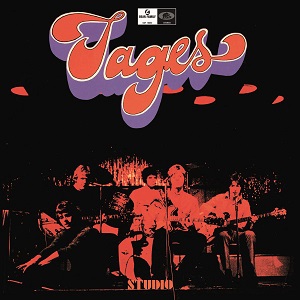
Studio is the fifth studio album by the Swedish rock band Tages, released on 4 December 1967 on Parlophone in Sweden. Following the success of their album Contrast, Tages began working on their follow-up to it. Hampered by a long summer tour, the album was largely recorded between October and November 1967 with sessions spanning all the way back to April. It was primarily recorded at Europafilm Studios in Bromma, Stockholm with Anders Henriksson producing. The band took a break in recording the album in October for a tour of England organized by Parlophone, which allowed them access to EMI Studios in London, where two of the album's tracks were recorded. One single was released from the album, "She's Having a Baby Now" and the sessions also produced the non-album single "Treat Her Like a Lady".
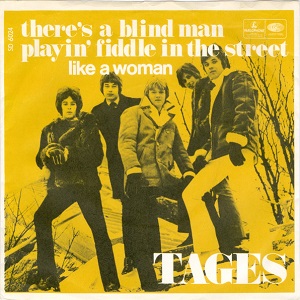
"There's a Blind Man Playin' Fiddle in the Street" is a song written by Swedish bass guitarist Göran Lagerberg, initially recorded by his band Tages. In December 1967, Tages released their fifth album, Studio, which largely was inspired by and saw influences from Swedish folk music; this had a major impact on Lagerberg. Inspired by the Beatles' single "Strawberry Fields Forever" / "Penny Lane" from a meeting with club owner Styrbjörn Colliander, Lagerberg composed the song in a more commercial tone than Studio, while still retaining the genre's influences. First released as a single on 8 February 1968 in Sweden, the song also received release in Denmark, Finland, Norway and the UK, where it was Tages' fourth single release.

Contrast is the fourth studio album by Swedish pop band Tages, released on 28 April 1967 through Parlophone Records. Contrast was preceded by a tumultous period in Tages' career, in which drummer Tommy Tausis left the band for the Spotnicks only days before recording commenced. The album is the first to feature Tausis' replacement Lasse Svensson, who would stay with the group until 1969. It was also Tages' first album to be released through Parlophone, following three albums by independent record label Platina. Parlophone guaranteed Tages free studio time, resulting in the sessions for Contrast.


